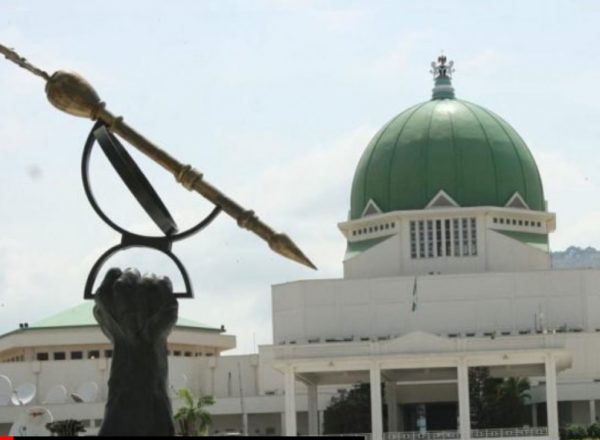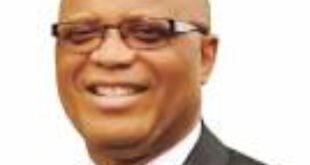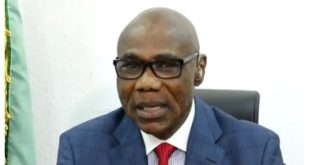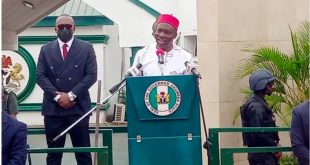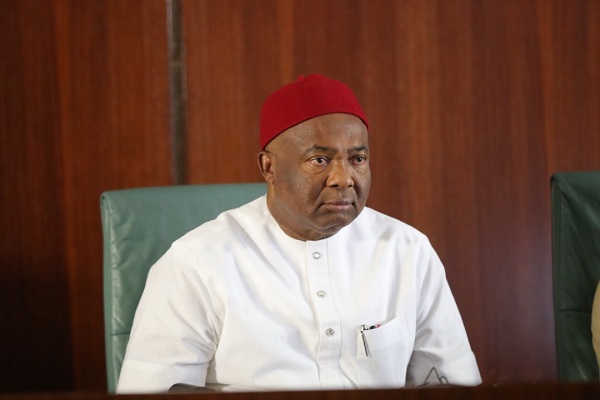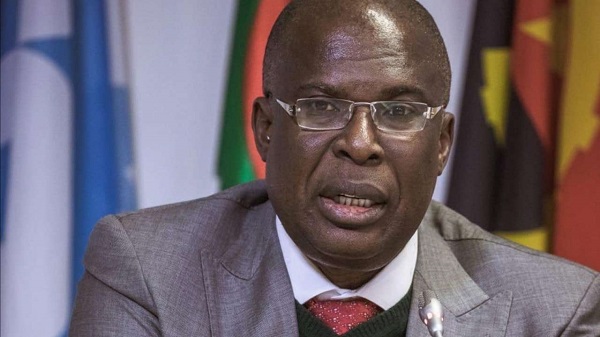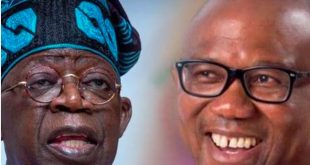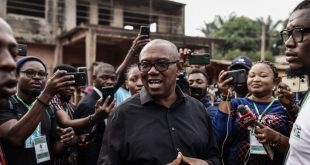The House of Representatives members-elect of the Peoples Democratic Party, the Labour Party and other opposition parties have formed an alliance ahead of the inauguration of the 10th National Assembly, with the aim of determining the leadership of the parliament.
Against the background of the moves by the ruling All Progressives Party to zone the house leadership, the opposition lawmakers insisted that they have the numbers to override the APC’s plans and do whatever they want.
The lawmakers-elect met in Abuja on Tuesday night where they fine-tuned strategies for using their numbers as bargaining power in their negotiations with the speakership aspirants.
Media gathered that the opposition lawmakers-elect, at the meeting, planned to work together to influence the election of the 10th House of Representatives leadership.

So far, no fewer than 10 persons have indicated interests in being the speaker of the green chamber.
At their Tuesday strategy meeting, the lawmakers-elect unanimously formed a group, ‘10th Assembly: Greater Majority.’
In attendance were old and newly elected members of the House on the platforms of the PDP, the LP, the New Nigeria People’s Party, the All Progressives Grand Alliance, the Social Democratic Party, the African Democratic Congress and the Young Progressives Party.
Also present at the parley were ranking members of the House, including Oluwole Oke (PDP/Osun), Beni Lar (PDP/Plateau), Boma Goodhead (PDP/Rivers), Bamidele Salam (PDP/Osun), Dachung Bagos (PDP/Plateau), and Jonathan Gbefwi (SDP/Nasarawa), as well as a former ranking member, Abdulmumin Jibrin (NNPP/Kano), who has been reelected back to the parliament.
Out of the results so far declared by the Independent National Electoral Commission, the APC won 162 seats in the House while the opposition parties claimed 163 seats.
Speaking with media on Wednesday, one of the organisers of the meeting, Ali Isa, said the opposition parties had the numbers to get what they wanted.
He stated “For now, the opposition has not taken any decision. We are still consulting. But we have the numbers to do anything we want.
“All the political parties, – LP, APGA, YPP, SDP, ADC and PDP – came together to be united; to also see what we can do to help this country. As I earlier said a few days ago, the National Assembly is an arm of the government and we as lawmakers are ready to work for the country; we are ready to ensure that every bill that will change the life of the common man sees the light of the day in the Assembly.
“We will also appreciate if the executive will allow the lawmakers to enjoy independence. We will also not interfere in the affairs of the executive.”
According to him, the opposition lawmakers will not recognise the zoning of the leadership positions by the APC.
Isa stated, “We have no business with any zoning. We in the opposition, what we are looking at is to unite the country to ensure people benefit. We don’t have any agenda for zoning on our table.”
Bagos, who anchored the meeting, noted that the minority parties “will achieve what nobody thinks we can achieve.”
Convener of the coalition, Fred Agbedi (PDP/Bayelsa), in his welcome address, said it was the inaugural meeting of the minority caucuses which he referred to as the ‘Greater Majority’ of the expected 10th House.’’
He stated that the results of the 2023 elections indicated that the opposition members could exert a lot of influence if they were united.
Agbedi said, “This session is to enable us to network, interact and familiarise ourselves as people that the results of the 2023 general election have thrown up as a new phase, having numbers that give us greater strength to deepen opposition politics and democracy.
“Therefore, we need to realise such and bond in the interest of our parties and the people we are here to represent.”
In their goodwill messages representatives of the seven opposition parties, namely PDP, LP, NNPP, SDP, APGA, ADC and YPP hinted at the ideas behind the coalition.
Opposition lawmakers
Addressing her colleagues, Lar said it was her “sincere wish and prayer” that as the opposition united to “start this journey of unity and friendship, achieving a common purpose and goal, “they would work together, define their interests and have a common understanding “to bring about good leadership not just among ourselves but within the National Assembly in the 10th Assembly.”
The fifth-timer noted that Jibrin “had always played a role” in the emergence of speakers in the House “and I am sure you will play a role, Abdul.”
She added that the Kano lawmaker “will not be silenced in the face of oppression in the National Assembly.”
She said, “It is a great joy to see that for the first time in a long time, the opposition, together, has become the majority in the 10th Assembly. All of us out together are now the majority and a greater majority for that matter. This is something that is priceless; something that many parliaments around the world seek to achieve but cannot achieve.”
In his remarks, Jibrin said he was excited “that we were able to pull this through today.”
Jibrin was said to have played a significant role in the emergence of Aminu Tambuwal, Yakubu Dogara and the incumbent Femi Gbajabiamila as successive speakers of the House.
Jibrin had lost his re-election bid for the current 9th House on the APC platform.
Jibrin was one of the leading campaigners for the President-elect, Bola Tinubu.
He, however, dumped the ruling party for the NNPP and got re-elected to the House for the 10th Assembly.
He said, “Fundamentally, the reason why we had to come together, work day and night to see that we bring all the minority parties (together), which is now known from today as the ‘Greater Majority’ is because we also understand that for us to be able to put through our collective interests; for us to be able to protect our ideals as minority parties that fundamentally serve as a check to the ruling party; for us to be able to contribute to the nation-building, we must come together.”
Jibrin added, “I am telling you this with a sense of sincerity: whoever calls you for any meeting and tells you anything, they are not telling you the honest truth. If we do not put ourselves together – and we thank God that we have been able to do this today – we will not be able to march up to our interests.
“Please, I beg of all of us, let us continue the way we have started today. We will continue to put in our best to see that everybody and every member of this caucus are carried along, while also protecting the individual ideas and philosophies of the various parties that we come from.”
LP pledges commitment
Speaking for the LP, George Ozodinobi from Anambra State said, “We are a minority caucus. We are pledging commitment to this unity of the great alliance of the 10th Assembly. I believe that we are all minorities coming together for a common purpose, to stand firm for the overall benefit of us, irrespective of seniority, considering also the ratio in an alliance.
“I stand here on behalf of the 34-strong and vibrant members-elect of the LP, believing that this bonding shall attract even and mutual benefits to us in this 10th Assembly.”
Sources at the meeting held behind closed-doors said the coalition of minority parties may wrest power from the ruling All Progressives Congress, which presently has a majority in the House.
Expressing confidence in the coalition, a PDP lawmaker who did not want to be identified said, “We can beat the APC after the supplementary elections. Anything can happen.”
From the results of the 325 seats in the House so far declared by the Independent National Electoral Commission, APC won 162 seats, while seven opposition parties have a total of 163 seats.
A breakdown of the minority caucus membership configuration shows that the PDP has 102; LP, 34; NNPP, 18; APGA, four; ADC, two; and SDP, two; and YPP, one.
A returning member of the PDP, who spoke on the condition of anonymity as he was not allowed to disclose the intention of the meeting, said the opposition parties might form the majority after the supplementary elections.
The INEC has so far declared winners in elections for 26 governorship, 104 senatorial, 329 House of Reps and 935 state assembly seats and is billed to conduct supplementary elections in 2,660 polling units across 185 local government areas in 24 states on April 15.
Before the meeting, our correspondent gathered that members of the minority caucus in the House were waiting for the outcome of the 2023 general elections rerun to determine their numerical strength and select new leaders for the 10th National Assembly.
Several members of the caucus in separate interviews with media source noted that both the majority and minority parties would determine the leadership of the next assembly.
A ranking member of the House, Oluwole Oke (PDP/Osun), noted that the results of the polls so far declared by the electoral commission had indicated that the minority caucus in the 10th House would be constituted by members of seven opposition parties.
Oke said, “We are not talking about minority leadership for the 10th Assembly now. The 9th Assembly has yet to wind down. We still have supplementary elections here and there in some Federal Constituencies. It is after all the elections have been concluded that we would see the whole picture.
“Political Parties will definitely have a say in who becomes the Minority Leader. Aside from APC, we now have seven other political parties. Yes, PDP has the second largest no of members after APC but we all need ourselves to give our nation the best.”
Similarly, another ranking member of the PDP from Rivers State, Dagomie Abiante, noted that the outcome of the supplementary would go a long way in determining the next leaders of the House.
Declaring support for the bold moves by their members-elect, both the PDP and LP said they would encourage them to contest for leadership positions in the federal parliament.
The PDP confirmed that talks were ongoing with other political parties to win the support of their members-elect in pursuit of the speakership ahead of the inauguration of the 10th National Assembly.
PDP eyes position
The National Publicity Secretary of the party, Debo Ologunagba, said, “The conversations are on but we have to be patient with the process. It is true that if things go on as expected, the PDP can produce the speaker but talks are still at a preliminary stage. We will cross the bridge when we get there.”
The National Chairman of the LP, Julius Abure, explained that the end goal of the partnership by the opposition parties was to ensure the interest of the Nigerian people was secured.
Giving a hint of what is to come, a member of the 9th House of Representatives, Richard Agbo said, “The PDP minority caucus is still consulting widely to take a definite position. Though we have not taken any firm position on the 10th Assembly speakership, it is likely that the minority parties will sponsor a candidate for the position of the speaker and I can tell you too that the minority caucus will definitely play a critical role in who becomes the speaker.’’
However, the APC is not taking lightly the manoeuvre by the opposition parties to take over the national assembly principal offices, stating that it will not stand by and allow this to happen.
Speaking to The PUNCH on the development, the APC Director of Publicity, Bala Ibrahim said, “We are not going to witness that. All hands are on deck to ensure there is a smooth transition between the 9th and 10th Assembly. As the leading party, nothing will be out of control.
“Some people are peddling false information and fake news all over the place to overheat the arrangement. But I assure you that everything is (being) done in such a way that nothing untoward is likely going to happen.”
Recall that the National Chairman of the APC, Senator Abdullahi Adamu, last month advised the party members to avoid what happened in 2015 when Senator Bukola Saraki and Yakubu Dogara worked with the opposition PDP to emerge the President of the Senate and the Speaker respectively.
Faulting the opposition coalition, the Chairman of the House Committee on Media and Public Affairs, Benjamin Kalu, told media that majority status would be determined by the number of a party and not a coalition of parties.
Kalu, said, “The House Rule is very clear with regards to who forms the majority and who becomes the speaker and from where. I am sure that when the House Rule speaks about the majority, it speaks about a single party, not a coalition of minority parties coming together. That is a different thing. The minority parties coming together can form a caucus with minority leadership. But to use that as a formula to determine the Speaker, based on our House Rule, it might be difficult.”
 MMS PLUS NG – Maritime, Aviation, Business, Oil and Gas News Online Newspaper with coverage in Maritime, Oil and Gas, Aviation, Power and Energy as well as Financial News
MMS PLUS NG – Maritime, Aviation, Business, Oil and Gas News Online Newspaper with coverage in Maritime, Oil and Gas, Aviation, Power and Energy as well as Financial News

